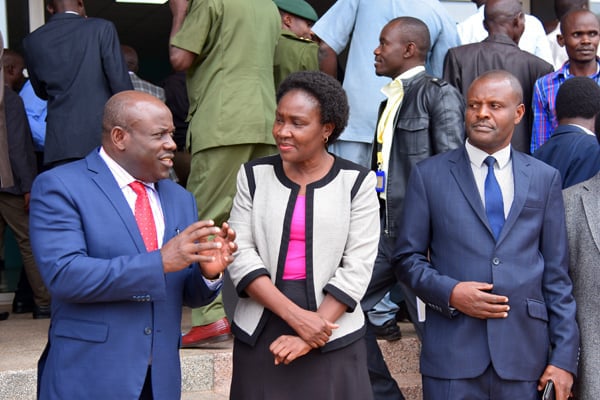Prime
Govt designing new exam papers for S.4

UCE candidates at Global Secondary School Madudu attend briefing on October 14, 2022. PHOTO/DAN WANDERA
What you need to know:
- The questions are expected to be framed in a way that requires learners to use their skills and knowledge to solve problems.
The National Curriculum Development Centre (NCDC) and Uganda National Examinations Board (Uneb) are in the final stages of developing modalities for the first cohort of the end of year cycle examinations slated for next year.
Senior Three students of the lower secondary curriculum will be the beneficiaries of the first cohort when they are promoted to Senior Four.
In an interview with Monitor yesterday, the manager of the secondary department at NCDC, Mr John Okumu, said the Uganda Certificate of Education (UCE) questions will be different from those in the old curriculum.
He said the questions in the new curriculum will require critical thinking where students are tasked to find solutions to the country’s common problems.
“The new questions will be framed in a way that a learner will be required to use the skills and knowledge they acquired in class to answer questions in the form of problem solving,” Mr Okumu said.
“The new approach will be against reproducing crammed work, which was limiting development of critical thinking among learners,” he added.
Mr Okumu said they were also finalising modalities of the structure of the new question papers, including how the transcript should look like and the nature of questions to be set, which he said should correlate with the new lower secondary curriculum.
After the modalities have been agreed upon, teachers will be taken through samples of the questions that will be set to prepare their candidates.
Examiners had reservations about the implementation of the new curriculum and how papers would be set.
Mr Okumu, however, clarified that Uneb will train their examiners once the guidelines for the pioneer examinations have been agreed upon.
The Uneb spokesperson, Ms Jennipher Kalule, confirmed the developments yesterday, saying all schools with Uneb centres are expected to submit the 20 percent class assessments for Senior Three students.
The 20 percent class assessment mark will form part of the 100 percent a learner will attain at the end of the cycle (UCE).
“Schools will submit the continuous assessment of their learners starting this year, first term. These marks are going to be sent to us online through the school’s portals,” Ms Kalule said.
Mr Okumu said students whose schools fail to submit their continuous assessment will not be graded at UCE.
“Just like at university when one fails to submit their coursework work, even if he or she scores 100 percent at the end, he or she is not graded. The same will apply here. Schools should be keen and ensure that assessment of all their learners is handed in,” Mr Okumu said.
The Ministry of Education last year said Uneb will partially grade the current Senior Three students using marks attained through continuous assessment (class work) when they sit for their UCE. Some sources in the ministry said some schools and teachers are still reluctant to implement the new lower curriculum.
The ministry’s Permanent Secretary, Ms Ketty Lamaro, last year said several schools had continued to use the old curriculum, which uses a traditional knowledge-based approach.
“As part of the consequences, students in schools that fail to comply with this directive will miss the 20 percent marks assessment that contributes to the final grading by Uganda National Examinations Board,” Ms Lamaro said.
The ministry rolled out the new lower secondary curriculum in 2020.
Schools are supposed to assess learners based on their competencies through activities of integration and projects which will be conducted in Senior Three.




